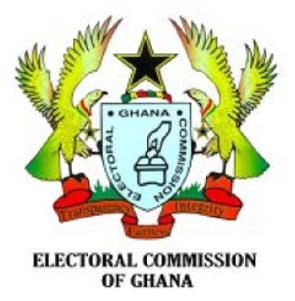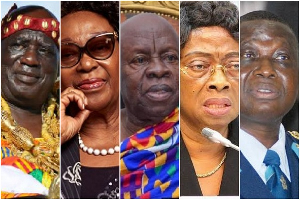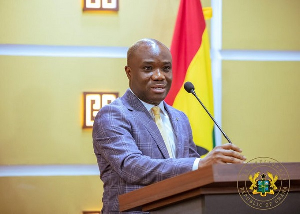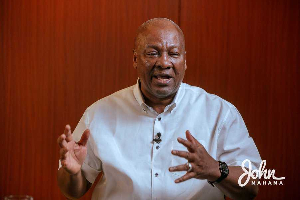This article is a contribution reoccurring debates on voters’ register that in my view appear to undermine the independence of the Election Commission (EC).
Article 46 of the 1992 Constitution states, “except as provided in this Constitution or in any other law not inconsistent with this Constitution, in the performance of its functions, the EC, shall not be subject to the direction or control of any person or authority”.
Article 45 also states, “the EC shall have the following functions -
compile the register of voters and revise it at such periods as may be determined by law; demarcate the electoral boundaries for both national and local government elections; conduct and supervise all public elections and referenda; educate the people on the electoral process and its purpose; undertake programmes for the expansion of the registration of voters; and
perform such other functions as may be prescribed by law.
For the past decade, I have observed an unhealthy development in Ghana that threatens the true independence of the EC, especially in the performance of its constitutional duties (a), (b) and (e) above. That is, any time the EC attempted to revise the voters’ register, prepare new voters’ register or create new constituencies, the party in government-supported EC’s decisions whilst the party in opposition opposed the decisions.
For example, in 2012, when the EC decided to create 45 new constituencies, the then ruling NDC strongly supported the decision whilst the then opposition NPP vehemently opposed it. When the EC decided against preparing a new voters’ register in 2016, NDC supported it whilst NPP opposed it.
Again, in 2016, NDC supported the EC’s decision to allow the use of the NHIS card to register to voter but NPP opposed it until the Supreme Court ruled that it was not proof of Ghanaian citizenship so should not be accepted.
The Supreme Court then ordered the EC to remove the names of all those who used the NHIS card to register from the voters’ register, yet the EC under the leadership of Mrs Charlotte Osei failed to do so with the support of the NDC. In fact, at the time ministers and leading NDC members virtually became spokespersons for the EC. For example, Abraham Amaliba of the NDC Legal Team turned himself into EC’s Attorney and interpreted the Supreme Court order on this matter by claiming that the EC’s failure to act as directed by the Supreme Court was legal.
Then, the NPP became the ruling party in 2017, Mrs Charlotte Osei was impeached as EC Chair in June 2018 and Mrs Jean Mensah was appointed EC Chair in July 2018. Since then, every action and decision of the EC has been supported by the NPP whilst the now opposition NDC has opposed actions and decisions of the EC. The two leading political parties have played this dual but opposite roles to their own advantage and to the disadvantage of the national interest of developing and enhancing democracy and accountability.
In the current controversy over a new voters’ register, the two parties have taken entrenched positions to such an extent that common sense has been thrown to the dogs. What is worrying is that, when in power, their actions create the impression that they are acting for and behalf of the EC. A typical example was the case of Abraham Amaliba of the NDC in the past and the current NPP leadership and ministers are no different.
The General Secretary of the NPP was reported to have asked the various security agencies to be on high alert for the compilation of the new voters’ register and added that the staff of the EC must be given adequate protection by the security agencies to ensure that they go about their registration duties without fear or favour (see, “Registration Exercise: Be on the alert for recalcitrants - John Boadu tells security agencies”, (Peaceonline and Ghanaweb, May 29, 2020).
In what capacity is he ordering or asking the security agencies to protect EC staff? Can’t the EC leadership ask the security agencies to do so if they believe their staff would be at risk? He is not a minister, neither is he Commander of the Armed Forces or the IGP, so what gives him the authority to ask the security agencies to do their work?
Again, when the NDC issued a suit at the Supreme Court against the EC over requirements for the new voters’ register (passport and NIA Ghana Card), for unexplained reasons, the Attorney General was made a joint respondent with the EC? What has the decision of the EC to make those two documents the only eligible documents to register got to do the Attorney General? The Attorney General is part of the Executive cannot act for the EC because that would contravene Article 46 of the Constitution and threaten the independence of EC. The AG is the lead legal adviser to the Executive and not the EC.
The problem in Ghana and with the two leading parties is that, there are no distinctions between a ruling party and the government or the Executive. The two are not the same but often, officials of ruling parties act as if they are part of the Executive or government. Moreover, they believe that they should always support the actions and omissions of the appointees of the government or president, including constitutionally independent bodies, come what may, whilst the opposition party does exactly the opposite. This is wrong and bad for good governance and accountability
Another problem is that, either for fear of being removed from office, once appointed, the leadership of public institutions also believe that they must do the bidding of the appointing authority. They cannot assert their independence and act in the national interest. The above development has weakened governance and accountability in Ghana, a threat to democracy, free and fair elections and also raised unnecessary tensions in the country.
Yes, it is the responsibility of ruling parties to support the executive to deliver on their manifesto but ruling parties have no role to blindly support the actions of quasi-public bodies especially independent constitutional bodies just because the heads were appointed by their president.
The strong affinity with constitutional independent constitutional bodies just because the heads were appointed by their president/s does undermine their true independence. Until the two leading political parties understand their roles vis-à-vis the relationship with public bodies, especially the heads, governance and accountability will be a mirage in Ghana and the NPP/NDC game of being on the opposite sides of every matter decided by the EC will be detrimental to citizens and the nation.
Kofi Ata, Cambridge, UK.
Opinions of Wednesday, 3 June 2020
Columnist: Kofi Ata



















